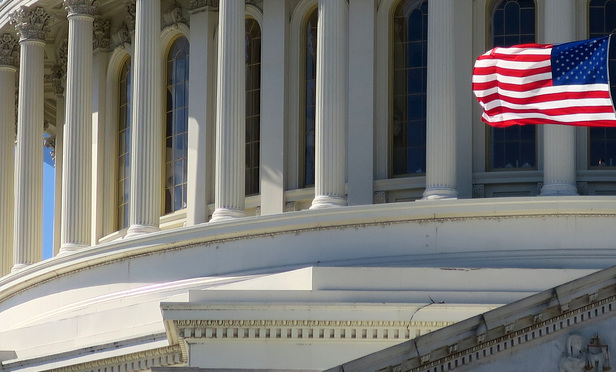 U.S. Capitol building in Washington, D.C. (Photo: Mike Scarcella/ALM)
U.S. Capitol building in Washington, D.C. (Photo: Mike Scarcella/ALM)
President Donald Trump’s proposal to cut to zero the budget of the Legal Services Corp., the largest funder of civil legal aid for low-income Americans, garnered widespread opposition. On Tuesday, 185 in-house counsel added their voices in a letter urging Congress to preserve the LSC’s budget.
The in-house attorneys, representing numerous industries and some of the country’s biggest companies, asked Congress to grant the legal aid nonprofit $450 million in FY 2018. They said in the letter that LSC is the “cornerstone of equal justice in America” and lauded the group for supporting “countless hours of pro bono representation provided by corporate legal departments and in-house attorneys.”
Many of the volunteer hours that in-house lawyers spend doing pro bono, the attorneys said, would not be possible without the funding and structure LSC provides for local legal aid groups across the country.
We reached out to several of the corporate lawyers who signed the letter to talk about the LSC and its connection to legal departments. The excerpts below are from those interviews.
John Schultz, executive vice president and general counsel, Hewlett Packard Enterprise, and chairman of the National Legal Aid & Defender Association Corporate Advisory Committee:
I hope that the administration and Congress understand the benefits that LSC provides. It’s not just benefits to Republicans or Democrats. It’s to veterans, it’s to low-income families, it’s to women in abusive households.
If for some reason the LSC isn’t protected I think you will see an erosion of those services and I think you’ll see a material impact on a lot of peoples’ lives. And it isn’t just people in the inner city—quite to the contrary. Many of these services are going to rural communities in what you’d consider currently to be red states. This would have a material impact across all political lines.
Ivan Fong, senior vice president for legal affairs and general counsel, 3M Co.:
I think we can’t take [LSC] for granted. I think the mission of funding access to justice for people who can’t afford a lawyer is such a core value that it’s worth pushing and fighting for. In the past, it has had very strong bipartisan support in Congress, so I’m hopeful that members of Congress understand and appreciate the value of the services that Legal Services Corp. provides to their constituents.
Mark Chandler, senior vice president, general counsel and chief compliance officer, Cisco Systems Inc.:
I feel very strongly that the credibility of our entire commercial law system—which is the heart of the rule of law and of the functioning of our economy—the credibility of that system depends on folks being able to get access to it, to make sure their rights are enforced and their contracts are enforced.
Matthew Fawcett, senior vice president, general counsel, NetApp Inc.:
If LSC is immediately defunded by half a billion dollars, there’s no way those communities are able to pick up that slack. Maybe New York could, maybe San Francisco could, but that’s the vast minority of places and people who need this kind of support. LSC is able to reach literally every single county in the United States—their reach is quite broad and their impact is very significant and that can’t just be replaced very easily.
Related Articles:




